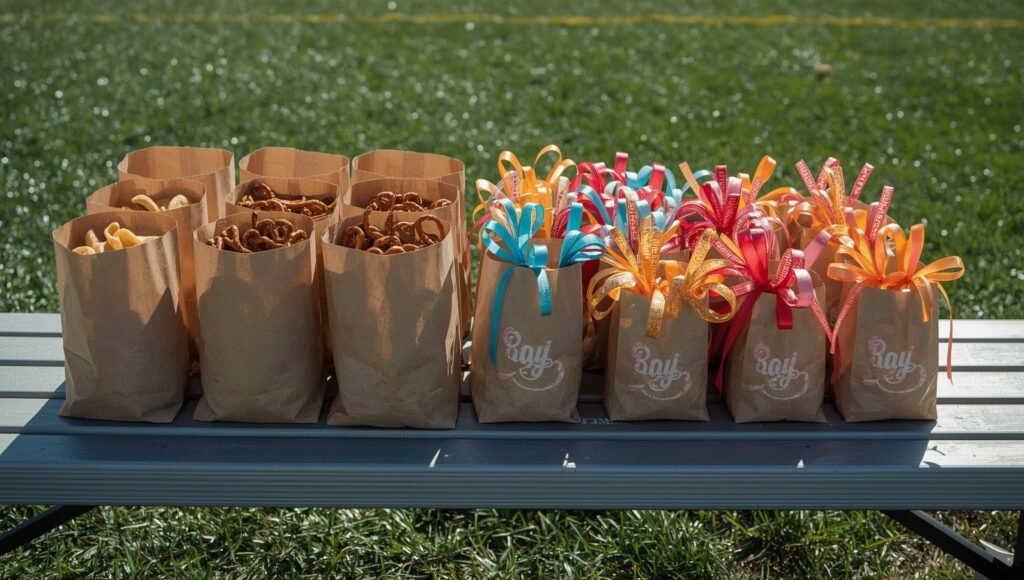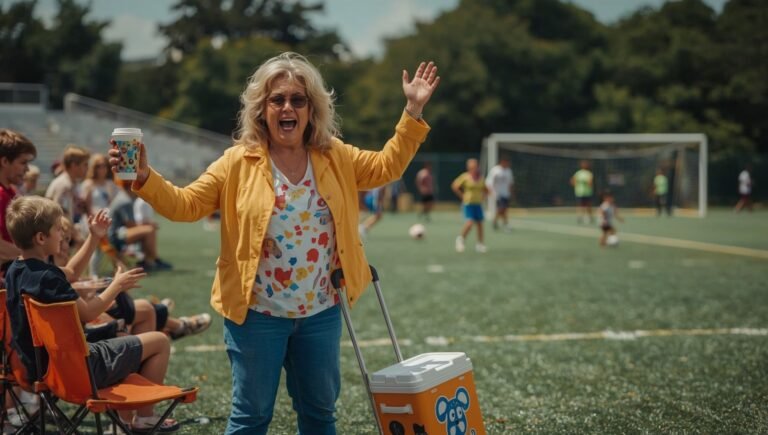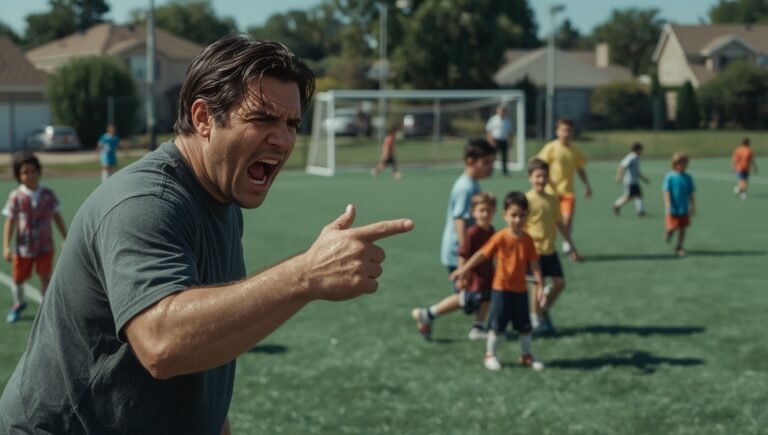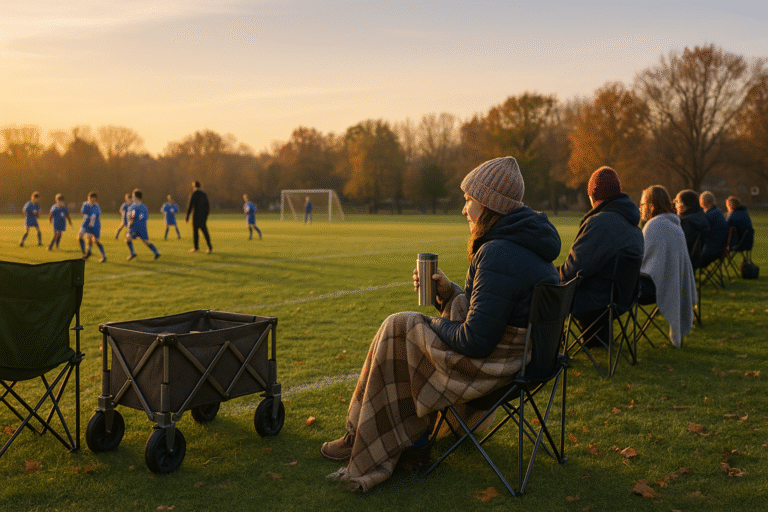Youth sports parenting is not for the faint of heart. It’s 6:30 in the morning, the grass is still wet with dew, and you’re balancing a cardboard cup of coffee that tastes like sadness while hauling a wagon loaded with chairs, coolers, and enough snacks to feed a small army. Your kid is yawning through warm ups, you’re wondering why the hell you didn’t buy stock in Gatorade, and the coach is already barking at a group of nine year olds like they’re preparing for the NFL Combine.
This is life in the youth sports pressure cooker. It’s not just a weekend hobby anymore. It’s a lifestyle that eats time, money, and sanity. One minute you’re signing up for a “fun local league,” the next you’re googling “best rolling cooler with cup holders” and mapping out a three-hour drive to a tournament in some town you’ve never heard of. If you’re nodding right now, you know exactly what I mean.
The Culture of Youth Sports Pressure

The youth sports culture in America has shifted into overdrive. Once upon a time, kids played pickup basketball in the driveway, Wiffle ball in the street, or street hockey with a tennis ball that was more duct tape than rubber. Those days are gone. Now, if your kid isn’t on a club team by age nine, other parents look at you like you’ve doomed their athletic future.
Sports that used to be seasonal are now year-round commitments. Soccer moms and lacrosse dads aren’t just cheering on weekends, they’re budgeting for private lessons, personal trainers, and summer camps with price tags that could fund a semester of college. Some kids barely finish their morning cereal before they’re headed off to strength training or “elite skill development sessions.”
And it’s not just about the kids, it’s about us, the parents. There’s an unspoken competition simmering in the bleachers. We all want to say, “My kid got invited to the elite tournament in Florida.” It’s bragging rights disguised as parental pride. Somewhere along the line, supporting our kids morphed into chasing prestige.
👉 This grind fits perfectly with the stories we tell over at Sideline Hacks: How to Manage Multiple Kids in Multiple Sports Without Crying.
When the Joy Fades: Burnout in Young Athletes

Here’s the part nobody wants to talk about: kids are burning out. Not teenagers, we are talking kids. According to Aspen Institute’s Project Play, millions of kids quit sports by age thirteen, often for one simple reason: it stops being fun.
The youth sports burnout signs aren’t hard to spot if you’re paying attention. The once-eager child who begged to play catch after dinner suddenly sighs when you mention practice. Injuries begin to pile up. Not from collisions, but from repetitive strain on joints that are still growing. Kids who used to play with joy now drag themselves to the field like they’re clocking in for a job they hate.
And here’s the kicker: often, they’re not quitting because they dislike the sport. They’re quitting because of the weight of expectations. Between overtraining, long seasons, and the constant push to “play at the next level,” fun has been replaced with obligation.
If you’ve ever wondered, is my child playing too many sports at once?, the answer might be written on their tired face during warm-ups. They don’t need us to be agents or recruiters. They need us to be parents.
👉 The CDC Youth Sports Injury Stats back this up. There are millions of sports-related ER visits annually, many from overuse and burnout.
Parents Pushing Too Hard

This is where parents pushing kids in sports psychology really comes into play. Sports psychologists will tell you that pressure isn’t inherently bad, small doses of stress can actually sharpen focus and build resilience. It’s why kids can step into a tough game, feel a little nervous, and rise to the occasion. But there’s a big difference between healthy challenge and constant pressure. When every car ride turns into a post-game breakdown, when every missed shot earns a lecture, when the sideline feels like a boardroom performance review, kids don’t build resilience. They build anxiety.
Instead of raising confident athletes, we risk raising kids who tie their entire self-worth to performance. A good game means they’re loved and celebrated. A bad game means silence in the car or an argument at home. That’s a dangerous message to send to a ten year old who just wanted to run around with their friends. Experts warn that this kind of pressure can lead to burnout, perfectionism, and even physical stress responses like stomachaches or trouble sleeping.
The irony? The harder we push, the less likely they are to thrive long-term. Studies show kids who feel supported and not micromanaged are more likely to stay in sports, perform better under pressure, and carry those lessons into life. But kids who grow up equating love with goals scored often leave the game entirely, carrying that weight into school, relationships, and adulthood.
👉 Johns Hopkins has published multiple studies linking parental pressure to increased anxiety in youth athletes.
Sideline Comedy: Where Sanity Goes to Die
If you really want to understand youth sports pressure, forget the kids for a moment and look at the sidelines. It’s like a bizarre social experiment where bleachers become therapy couches, folding chairs become thrones, and every parent suddenly thinks they’re a professional commentator for ESPN.
You’ve seen it! The dad pacing with his arms crossed like he’s about to call a timeout. The mom frantically refreshing the team app to make sure she didn’t miss a change to field assignments. The grandma who cheers for both teams because she doesn’t actually know which jersey color her grandson is wearing.
And then there are the sideline meltdowns. Every weekend, some poor ref making fifty bucks gets screamed at like he just ruined the Super Bowl. “That’s a foul in any universe!” one parent bellows. Another mutters, “Even my dog could call a better game.” Meanwhile, half the kids are wondering what’s for lunch.
It’s hilarious until you realize how tightly wound everyone is. Parents don’t just watch games anymore. They analyze them, critique them, even upload highlight reels before the sweat has dried. Somewhere between the $1,000 camera lens and the thirty-dollar stadium hoodie, the line between childhood fun and professional performance blurred.
Surviving the Sideline: Parent Gear That Saves Lives

Let’s be honest: the real MVPs of youth sports aren’t the coaches or even the kids. It’s the gear that keeps parents alive on the sidelines.
Bleachers, for example, were clearly designed by medieval torture enthusiasts. Sit on them long enough and your spine will file a formal complaint. That’s why a stadium chair with back support isn’t a luxury, it’s sideline survival.
Then there’s the sun. Summer tournaments transform parents into sweaty puddles. That one family with the pop-up canopy tent? They aren’t just prepared, they’re gods among mortals. Everyone else looks at them with envy while melting into the grass.
And of course, the holy grail of sideline parenting: the wagon. The collapsible wagon is basically the minivan of the field. Snacks, chairs, bags, a small sibling who “can’t walk”. Toss it all in! Bonus points if you accessorize with a rolling cooler that doubles as both hydration station and sideline throne.
One parent always shows up with the latest gadget too, like the GoPro Hero 12 strapped to a tripod, recording every second. The footage will mostly be shaky shots of grass and a blurry goal. But one day, when ESPN finally calls, they’ll be ready.
The Road Trip Diaries

Tournament weekends are family vacations in disguise. You pack like you’re moving cross-country, eat like you’re stranded in a Panera desert, and call it “bonding.”
Hotel pools become the true competition. Kids cannonball. Parents hover with takeout containers. Hotel staff quietly regret every sports booking.
And then there’s the late-night drive, Dad arguing with Google Maps, Mom stress-eating trail mix, and a kid in the backseat whining, “Did we win or not?”
It’s chaos, it’s exhausting, but it’s also where memories are made. Years later, your child won’t remember the score of the semifinal. They will remember the hotel hallway races, the lobby pizza parties, and the time their whole team got kicked out of the pool for turning it into a water polo match.
Encouragement vs Pressure
Encouragement is everything in youth sports, but there is a point where encouragement crosses the line and turns into full-on youth sports pressure. Every parent thinks they’re being helpful, but kids know the difference. When you yell “You’ve got this, I believe in you,” they feel ten feet tall. When you say “We’re paying thousands for this team, so don’t blow it,” they suddenly feel like they’re carrying the mortgage on their back while trying to dribble a ball.
Kids pick up on more than we give them credit for. They notice the heavy sigh when they miss a goal. They hear the little mutters you think are quiet. They see you pacing up and down the sidelines like a stressed-out day trader watching the stock market crash. What’s supposed to be fun playtime with their friends starts to feel like they’re auditioning for a spot in the Premier League.
This is where experts in sports psychology wave the red flag. A little stress can actually be good, it teaches kids how to focus and perform under pressure. But constant youth sports pressure from parents has the opposite effect. Instead of building confidence, it chips away at it. Instead of creating resilient kids, it creates kids who think their entire worth is tied to how many goals they score or whether they made the A team. That’s not childhood, that’s a full-time job with no paycheck.
And let’s be honest, we’ve all seen it play out in the dreaded car ride home. The kid is slumped in the backseat, sweaty, tired, just wanting an ice cream cone, and here comes Dad delivering a thirty-minute post-game TED Talk about “hustle” and “giving 110 percent.” Mom is in the passenger seat pretending to check her phone, but secretly she’s calculating how much therapy this lecture is going to cost in ten years.
👉 Johns Hopkins Medicine has shown again and again that too much parental pressure in sports is tied directly to higher anxiety, burnout, and even physical injuries in young athletes.
Expert Insights
Sports medicine experts like Dr. Neeru Jayanthi have been sounding the alarm for years. His research shows that kids who lock into one sport too early are more likely to burn out and break down. The body can only take so much of the same repetitive motions before it waves the white flag. The mind can only take so many year-round seasons before the fun gets squeezed out completely.
On the other hand, kids who play multiple sports tend to be healthier, happier, and less likely to flame out before high school. They build different muscles, learn different skills, and most importantly, they actually enjoy themselves.
And let’s talk about scholarships, because this is the dream that fuels a lot of the pressure. Only about 2 percent of high school athletes get them, according to NCAA research And those scholarships? Most don’t even cover the cost of tuition, never mind room, board, or the ten thousand dollars you’ve already sunk into travel tournaments and gear.
So if you are banking on your child’s future being fully funded by a lacrosse stick or a pair of cleats, you might want to buy a lottery ticket while you are at it. The odds are about the same as winning the 50/50 raffle at the snack bar, and at least with the raffle you get to keep the nachos.
Snack Politics: The True Rivalry

Forget the game, the real drama lives on the snack table. Parents will forgive a missed pass or a weak defensive play, but they will never forget who showed up empty handed on their snack duty week. One parent forgets entirely, another proudly brings celery sticks like this is a wellness retreat, and then there is always that one Pinterest family with color coordinated ribbons and individually wrapped goodies that look like they belong at a wedding reception.
Meanwhile, the rest of us are standing there with a box of off brand granola bars from the grocery clearance rack, praying the kids are too distracted to notice. But kids notice everything. They will trade teammates for a better snack bag faster than they will trade baseball cards.
It does not matter who scored the winning goal or who made the game saving block. In the world of youth sports pressure, your reputation as a parent can rise or fall on whether you brought nacho flavored chips or kale bites. If your snacks flop, you are toast. Literally.
Hotel Hallway Olympics

Away tournaments don’t just mean games, they mean the nightly chaos of kids turning hotel hallways into their own personal track and field. Coaches swear up and down that lights are out at ten, but the reality is relay races, wrestling matches, and impromptu soccer games in the corridor until midnight.
Parents know the drill. Some try to play hallway cop, shushing kids while wearing pajamas and clutching a plastic cup of boxed wine. Others give up entirely and just hope their child can survive the next day on four hours of sleep and a hotel waffle that tastes faintly of cardboard and desperation. Meanwhile, the front desk clerk is one noise complaint away from banning your entire team for life.
This is the part of youth sports pressure nobody posts on Instagram. The kids are overtired and wired on Gatorade powder, the parents are cranky from fast food and folding chairs, and yet somehow these moments stick. Long after the tournament trophies collect dust, families remember the hotel hallway races, the late-night pizza deliveries, and the time the whole team got kicked out of the pool for trying to turn it into a water polo arena. Exhausting? Absolutely. But it is also the chaotic glue that holds the youth sports experience together.
Humor Keeps Us Honest
If there is one thing that saves parents from completely losing it under the weight of youth sports pressure, it’s humor. We laugh when the goalie accidentally scores on their own net and celebrates like it counts. We laugh when a coach trips over a water bottle and pretends nothing happened. We laugh when a dad screams “offside” like he is auditioning for the Premier League but clearly has no clue what it means.
Without humor, this entire youth sports pressure cooker would explode. With it, we survive. We bond in the bleachers, not just over the wins and losses, but over the shared absurdity of it all. Because let’s be honest, sometimes the funniest part of the game isn’t the action on the field, it’s the sideline circus happening right next to us.
Loosening the Lid
So, are we pushing too hard? Probably. But it is not too late to laugh at ourselves, to ease up, and to remember this is supposed to be fun. Youth sports should feel like a playground, not a corporate job interview in cleats. Kids need freedom to play, make mistakes, and learn without carrying the crushing weight of their parents’ expectations on every pass.
Cheer loud, pack the cooler, drag that canopy across the parking lot like it is the final event of the day, and maybe invest in a padded stadium chair so your back doesn’t give out before the season ends. Some battles are worth fighting, but turning every game into a life-or-death scenario is not one of them.
Loosen the lid, laugh more, and let the kids play. The trophies will gather dust, but the memories of laughter, road trips, and sideline friendships will stick for life. That is the real victory.
FAQ
Is my child playing too many sports?
If your kid is exhausted, constantly injured, or so miserable they’re begging to skip practice, the answer is yes. Rest is not laziness, rest is training too. Even professional athletes get recovery days, and your eleven year old does not need a grind schedule that would break LeBron. Watch for signs of youth sports burnout like mood swings, constant fatigue, or suddenly “forgetting” where their cleats are every single Tuesday.
How do I know if the youth sports pressure is too much?
Listen to the car rides. If your child goes silent after every game, avoids eye contact, or would rather sit through algebra homework than talk about practice, the pressure has tipped from healthy to harmful. A little stress can sharpen focus, but constant stress can crush confidence. When in doubt, ask your kid. Their answer will tell you more than any coach or stat sheet.
Do kids really need to specialize this early?
Nope. Research from Dr. Neeru Jayanthi shows that specializing too early increases the risk of injury and burnout. Multi-sport athletes tend to be healthier, happier, and more balanced. Playing different sports builds different muscles and skills and it keeps kids from feeling like they’ve been locked into one career path before middle school.
What are the real chances of a scholarship?
Slim. Only about 2 percent of high school athletes ever get a scholarship, and most of those don’t even cover full tuition. If you’re banking on college being paid for by youth sports, the odds are about the same as winning the 50/50 raffle at the snack shack. Play for the memories, not the imaginary full ride.








